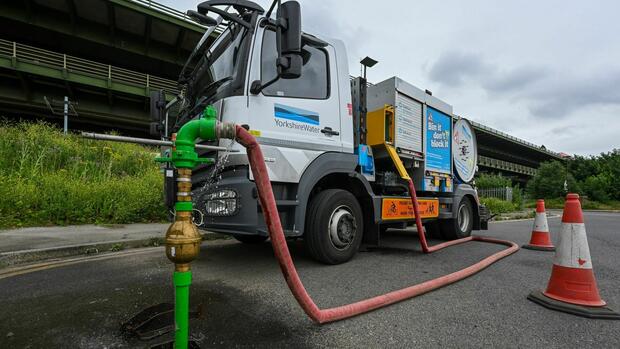London The ongoing crisis at Britain’s water utility, Thames Water, sparked heated debate in the UK about privatizing the sector in the late 1980s. Critics accuse private owners – often pension funds and private equity firms – of taking on huge debt and underinvesting in infrastructure – while paying large dividends to shareholders. Business representatives warn, however, that renewed nationalization could deter foreign investors.
The British regulator Ofwat is also caught in the crossfire. Critics complain that the supervisors have tried for too long to curb the increase in water charges and thus prevented the necessary investments in the infrastructure, which has been affected by numerous leaks.
The agency decided “that balance sheets were best left to companies and, worse, they encouraged asset-backed borrowing,” said Dieter Helm, an economics professor at Oxford University. The proceeds went to the investors. In times of low real interest rates, companies would have borrowed more and more.
At the center of the crisis is Thames Water, Britain’s largest water supplier with around 15 million customers, which has been in financial difficulties for the past week and which has since been threatened with government receivership. The reason for this is a mountain of debt of 14 billion pounds (equivalent to around 16.2 billion euros). The company asked its shareholders for £1.5 billion in new capital last year but has reportedly only received £500 million so far.
Over the weekend, Britain’s Universities Superannuation Scheme (USS) pension fund said it would support a recapitalization. With a stake of almost 20 percent, USS is the second largest shareholder in Thames Water after the Canadian pension fund Omers with almost 32 percent. For a long time, the British company belonged to RWE, which sold the water supplier to the Australian financial investor Macquarie in 2006. Since then, the company has gone downhill: the debt has increased and so have the distributions to the new owners.
Thames Water boss Sarah Bentley, who resigned last week, spoke afterwards of “years of underinvestment and poor decision-making that have eroded critical capabilities (of the company)”. Oxford economist Helm also blames the failure of state supervisors for the undesirable development.
Thames Water is not the only water company to fall into disrepute following privatisation. The supervisory authority Ofwat worries about the finances of a total of five companies. Balance sheet analysis shows the industry has racked up £60bn in debt since 1989, while paying dividends of more than £72bn.
In recent years, the companies have come under criticism for numerous leaks and the pollution of rivers by sewage. The private water companies invested almost 200 billion pounds in the infrastructure after privatization, but then gradually scaled back their commitment.
600 million liters of water seep away every day
As a result, Thames Water alone still loses more than 600 million liters of water every day through leaking pipes. According to the British Environment Agency, there were more than 300,000 incidents of uncontrolled discharge of sewage last year. Industry body Water UK has had to apologize for the pollution of rivers and beaches. No wonder that according to opinion polls, around two-thirds of Britons are in favor of nationalizing the water suppliers again.
“However, calls for the state are damaging Britain’s image with international investors,” warned Jackie Bowie, managing partner at British financial adviser Chatham Financial. The conservative government in London fears a “risk premium” for Great Britain as a business location. Especially since there has been tough locational competition for investors in public infrastructure since US President Joe Biden lured hundreds of billions of dollars in capital for the green transformation of the American economy into the country.
In addition, the regulator Ofwat now has more options to limit dividend payments if the water companies run into financial difficulties or fail to meet their environmental regulations. What makes sense in view of the grievances of the past is more likely to deter potential investors if they can generate higher returns elsewhere.
For Thames Water it’s all about survival. Even if the short-term recapitalization were to succeed, the company would not be saved. The interest rate on more than half of the accumulated debt is linked to inflation, which is still very high in the UK at 8.7 percent. The regulator Ofwat also blames the effects of high inflation on index-linked debt for the precarious financial situation in the water industry.
More: Thames Water is apparently to be nationalised
